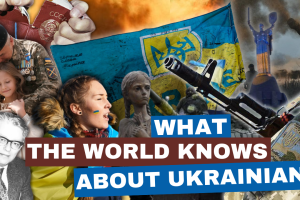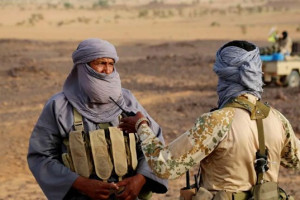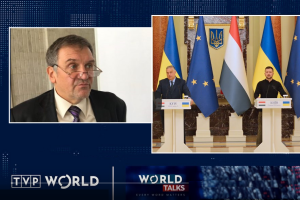Ilko Kucheriv used time to make world better place

Mark Rachkevych writes: Kucheriv was a big teddy bear with vision for democratic nation in NATO. Ilko Kucheriv and I got off to a bad start professionally. Wanting to impress when we first met in 2005, I mentioned that I had lived three years in Ivano-Frankivsk as a U.S. Peace Corps volunteer, as if this experience lent me credentials. He wasn’t impressed in the slightest. He said he didn’t have fond memories of the city, having done prison time there for “disseminating anti-Soviet propaganda” as a young Rukh activist.
I remember my relationship now after Kucheriv died on May 29, just before his 55th birthday, after battling lung cancer.

Ilko Kucheriv (Ukrinform)
Only later would I find out that he was more than a Rukh veteran of the independence movement that would give this young nation an unexpected birth in 1991. Kucheriv was also one of Rukh leader Vyacheslav Chornovil’s advisers. Ever loyal, Kucheriv would also be one of the first to arrive at the scene of Chornovil’s fatal car accident in 1999.
This event and others shaped Kucheriv’s views of the authorities. He never had any illusions or doubts as to how far they would go to maintain their grip on power and not share it with “rabble Rukh democrats.”
But before Rukh artificially splintered into many factions – perhaps with the help of the “authorities” -- Kucheriv and Chornovil co-founded Democratic Initiatives in 1992, a policy center to promote the country’s declared democratic route of development. They wanted to keep the spirit of the late 1980s alive and always saw themselves as the torch bearers of the pro-independence movement that swept Eastern Europe when the Berlin Wall was coming down. He knew he was part of a generation that stood for freedoms the West had enjoyed since World War II and likened himself to his Baltic brothers to the north; the Velvet Revolution brethren in Slovakia and the Czech Republic; and the Solidarity coalition in Poland that swept Lech Walesa to power in 1990.
Always believing in actions more than words, Kucheriv eschewed rhetoric and the spotlight of TV talk shows and attempts to co-opt his non-partisan stance in favor of sound sociological research. He collected bodies of arguments to demonstrate why NATO entry was in Ukraine’s best national interests. He commissioned in-depth studies to dispel the myth often spread by the international media of Ukraine’s supposed east-west divide. I, in particular, enjoyed Democratic Initiatives’ poll of the post-independence generation of Ukrainians, which showed how this strata of society was the most united in terms of national self-identity and European Union orientation.
That was Kucheriv’s style. Never the fireband, he’d show up at a news conference, calmly deliver his findings that showed, time and again, the public’s democratic inclinations. He’d match the provocative questions of journalists during the Kuchma temnyki era with ease. He believed fully in the integrity of his organization’s findings and what they meant for a democratic society. He knew that, in a democracy, one doesn’t have to agree. Dialogue and public debate were more important.
It was he who made the term “exit poll” a household name in 1998. It is an essential tool in determining whether election results reflect the people’s will.
It was Kucheriv who, during a 2003 visit to Kyiv by NATO Secretary General Lord Robertson, asked for personal NATO membership despite his country’s lack of enthusiasm for it. Robertson obliged with a handshake and a smile.
Renegade and humoristic streaks aside, Kucheriv was a patriot of Ukraine to his core. He wouldn’t ever trade Ukraine for another place of residence.
Over time, Kucheriv would make a small hole-in-the-wall bar, the Drum, his speakeasy hangout. This is where he’d meet with many of his foreign colleagues over his usual drinks of vodka-cola on the rocks, sipping while patiently listening to monologues about how to improve his organization. He was a listener and thinker. He was a one-man show. He thirsted for Western know-how.
I recall meeting Kucheriv at the Drum when he returned from his six-month Reagan-Fascell fellowship in Washington, D.C. in 2006. Like many who come back from stints in the West, full of ambition and fresh ideas, Kucheriv proclaimed that he’d start to engage in public diplomacy, whose practice he said would make Democratic Initiatives the preeminent think-tank in Ukraine, on par with the Cato or Brookings Institute.
I didn’t have the heart to tell him that he’d been practicing public diplomacy ever since 1992, and successfully at that. That’s the kind of person he was. He was the big, serious teddy bear with a vision.
And for all his time-management and organizational flaws, I could hardly refuse a meeting with him -- to consult, offer advice, to push for using new social media tools in getting his organization’s word out.
He was driven and optimistic to the end. When he learned he had cancer he brushed off the chemotherapy sessions as if they were annoying intrusions into his life. “It’s like having a four-day hangover, that’s all, I work when I can, eat when I can, and brace for the next one,” he told me over the phone a week ago, while I was on vacation in Chicago.
On May 28, the day before his death, Kucheriv even made a new hire during a staff meeting when he announced that the organization will devise a 20-year strategic development plan. He was pushing ahead in his usual form. That very same day, he posted a profoundly optimistic message on his website: “I believe that people can and should change the world for the better.”
It was a no-fuss message based on his life’s credo of positive thinking. He died not having yet reached his 55th year. His legacy to his people, his nation and country – in the name of democracy – remains. May he rest in peace.
Democratic Initiatives Foundation was started in 1992 out of the Ukrainian Citizens Movement (Rukh) to develop an independent Ukrainian state, a market economy and a vibrant democratic society. One of Ukraine’s few independent and non-partisan policy centers, Democratic Initiatives has fostered public discourse on the most pressing issues It has a track record of more than 200 studies, hundreds of analytical publications and several Internet sites. Democratic Initiatives Foundation is recognized as a reliable policy analysis source and has conducted exit polls of local and national elections since 1998, including the fraud-mired 2004 presidential vote. It has been led since its inception by Ilko Kucheriv, who died on May29 after battling lung cancer.
Kyiv Post staff writer Mark Rachkevych can be reached at rachkevych@kyivpost.com








